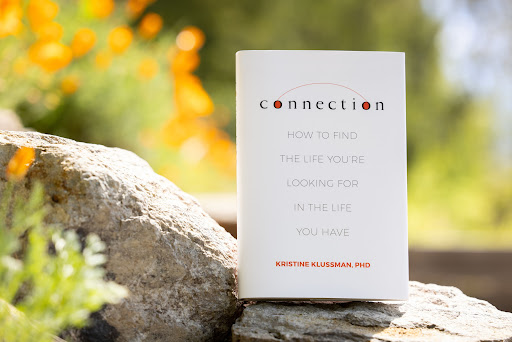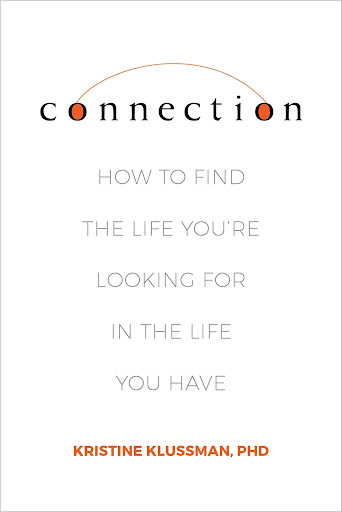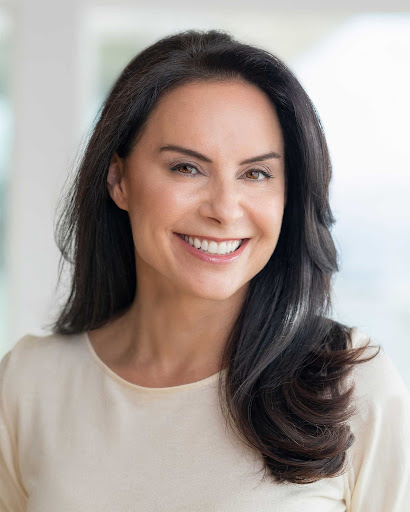Dr. Kristine Klussman’s new book focuses on inner connection

PALO ALTO, California – Even before pandemic-induced loneliness set in, nationwide studies found that nearly half of Americans feel alone or left out, and Generation Z (ages 18-22) is the loneliest generation. As the world opens up and we can begin to navigate the anticipations and expectations of what it means to be with others, clinical psychologist Dr. Kristine Klussman introduces the role of inner connection in personal wellness and happiness. Klussman’s Connection Theory, a pioneering approach to integration of the widely researched and well-known personal wellness practices of modern time, lays the foundation for a deep sense of meaning and purpose in life that transcends ordinary happiness in her new book “Connection: How to Find the Life You’re Looking for in the Life You Have.”
We are in the midst of an epidemic of loneliness. Though modern technology purports to “connect” us like never before, we live increasingly isolated and insulated lives, painfully disconnected from each other, from our values, and from ourselves. Indeed, almost 70 percent of Americans report they don’t have a single person they can confide in. Widespread concern about the costs and consequences of disconnection has growing implications for public health policy. Ahead of the curve, “Connection” is a consoling companion for those struggling and a handbook for prevention and treatment.
Rooted in established scientific findings, as well as her own research and clinical experience, Harvard-trained psychologist and connection researcher Dr. Kristine Klussman’s approach to wellbeing is simple and transformative. Klussman shows us that the way to achieve true happiness and fulfillment is not by striving toward them at all, but rather by cultivating connection in our everyday lives.
“Connection: How to Find the Life You’re Looking for in the Life You Have”
Dr. Kristine Klussman | April 13, 2021 | Sounds True
Nonfiction / Wellness | Hardcover ISBN: 978-1683647157
Praise for Dr. Kristine Klussman and “Connection”
 “This is one of the best books on personal growth I’ve ever read. With warm encouragement and easy, practical steps, Dr. Klussman brings us home to a natural connection, confidence, and ease. You can trust what she says since her path is grounded in science and she’s walked it herself. Clear, brilliant, and so hopeful, this book is a gem.” ―Rick Hanson, PhD, author of Resilient
“This is one of the best books on personal growth I’ve ever read. With warm encouragement and easy, practical steps, Dr. Klussman brings us home to a natural connection, confidence, and ease. You can trust what she says since her path is grounded in science and she’s walked it herself. Clear, brilliant, and so hopeful, this book is a gem.” ―Rick Hanson, PhD, author of Resilient
“In refreshingly skillful ways, Kristine invites us into deep connection and well-being underneath all our busy, separate lives. This is a wise vision and a transformative way to awaken.” ―Jack Kornfield, author of A Path with Heart and cofounder of Spirit Rock Meditation Center
“I think it is a very important addition to our understanding of how and why people metabolize challenges differently. It offers an important perspective for doctors, nurses, therapists, teachers . . . everyone in helping professions.” ―Sylvia Boorstein, PhD, author of Happiness Is an Inside Job
“This book helps us answer the fundamental WHY question―Why do I get up in the morning?―and then guides us to authentically stay awake on purpose.” ―Richard Leider, author of The Power of Purpose and coauthor of Repacking Your Bags
“This is a remarkable handbook for transformation. Kristine offers life-changing insights on what true satisfaction looks and feels like. This message will light the way to the world we all want: a more just, sustainable, and meaningful future for all.” ―Lynne Twist, author of The Soul of Money
“The greatest pandemic in modern history is loneliness. We are so digitally ‘connected’ and yet many feel so disconnected within ourselves. This book is not just timely, it is essential. Kristine’s unique approach of blending science, practice, and her own personal journey makes for a compelling read.” ―Philip McKernan, author of One Last Talk
“Ready for a clear roadmap to a meaningful life? Striving for a deeper connection to yourself and the world around you? Dr. Kristine Klussman has laid the path to get you there in her new book, Connection. Using her expansive experience and personal dedication to evolution, Klussman provides the keys to understanding yourself and how you fit, happily, into every day of your life.” ―Elizabeth Hamilton-Guarino, author of Percolate
About Dr. Kristine Klussman
 Kristine Klussman, PhD, is a Harvard-trained positive health psychologist, researcher, author, speaker, clinical supervisor, instructor and member of the Palo Alto University faculty. She founded and directs Connection Lab, a psychology research center exploring tools to help people live more meaningful, values-driven, authentic lives. As an invited keynote and TEDx speaker, she shares her approach to wellbeing at conferences and workshops around the country. Her San Francisco-based private practice also offers individual connection coaching. For more, visit kristineklussman.com.
Kristine Klussman, PhD, is a Harvard-trained positive health psychologist, researcher, author, speaker, clinical supervisor, instructor and member of the Palo Alto University faculty. She founded and directs Connection Lab, a psychology research center exploring tools to help people live more meaningful, values-driven, authentic lives. As an invited keynote and TEDx speaker, she shares her approach to wellbeing at conferences and workshops around the country. Her San Francisco-based private practice also offers individual connection coaching. For more, visit kristineklussman.com.
Follow Dr. Kristine Klussman on social media:
Facebook: https://www.facebook.com/drkristinek/
Twitter: @drkristinek | Instagram: @drkristinek
In an interview, Dr. Kristine Klussman can discuss:
- Connection in a post-pandemic world — How to stay connected with yourself, even as the world reopens and we feel pulled in countless directions
- The loneliness epidemic and how it was exacerbated by the global pandemic
- Understanding and evaluating the difference between short-term and long-term happiness
- The scientific research on which her theory is founded
- Actionable steps to find deeper connections with yourself and nurturing your own self-knowledge and integrity
- Signs of disconnection — and how to reconnect with yourself
- Ways to identify your real priorities, stay true to them and discover the courage to redefine them when needed
An Interview with DR. KRISTINE KLUSSMAN
We have all just come off of an incredibly challenging year; there have been many stories about Zoom fatigue, high levels of stress and anxiety, and burnout. Can you talk about the connection between self-connection (awareness of oneself) and burnout?
Burnout is a really interesting thing to consider right now and something I am hearing a lot of people talk about. We did a study on burnout and stress mindset and found that believing stressful events are debilitating tends to lead to more burnout. Self-connection, however, seems to be a protective variable that mediates individuals’ level of burnout.
One simple activity we can do to help reduce our sense of burnout is to sit down regularly and reframe our activities as “values in action” — for example, driving across town to get obscure ingredients for a friend’s birthday dinner might demonstrate your commitment to novelty, to creativity, and/or to being a good friend. Numerous research studies confirm that journaling about how your daily activities relate to your most important values reduces stress, boosts mood, confidence and perceived meaning.
As the pandemic subsides and the world begins to reopen, how can we stay connected with ourselves?
I think many of us are feeling disoriented after a year of having to live by a totally different set of priorities, and not be able to plan or set goals as usual. This year-plus of living so differently has also led to new insights and ideas on how we want to live our lives going forward and likely, many of our priorities have changed. More than ever, we need to reconnect with ourselves and our deepest desires—and the best way I know how to do this is by taking a thorough inventory and re-examining our values, priorities across all areas of our lives (work, health, friendships, parenting, spiritual, play, etc.). It’s so important to check in with yourself about what matters, identify what our priorities are now, and make sure we’re acting in harmony with those.
Another technique to reorient ourselves is to take a few minutes in the evening to reframe your activities of the day as “your values in action.” Numerous research studies confirm that journaling about how our daily activities relate to our most important values reduces stress, boosts mood, confidence and increases meaning.
Both of these techniques require us to carve out some quiet alone time for ourselves on a regular basis. We need to give ourselves space to sit with these big questions—and for introverts, who might be overwhelmed by the return of near-normal socializing, alone time is also essential for recharging your batteries.
How is it possible for there to be an epidemic of loneliness when there are more ways than ever to stay connected with other people?
That’s a bit like asking how someone can still be out of shape when there are so many types of exercise equipment available. A tool is only as useful as we make it. It’s important to recognize the difference between superficial connection and authentic connection. What I mean by connection is authentic — a mindful, sincere, open and loving engagement. More often than not, we’re only using technological tools for superficial connection — wordlessly “liking” other people’s posts, sharing carefully edited versions of our lives, etc. We certainly could be using social media, video calls, and email to develop or maintain authentic connection, but most of the time we’re not. We need to be more mindful in how we use those tools.
On that note, how do you maintain a genuine connection with yourself even with an excess of superficial connections (via social media or similar channels) at your fingertips?
I love the saying that attention and intention are wings of awareness — and how whatever you put your attention on, you make progress on. Just asking yourself the question: “Am I feeling connected right now?” is a great way to begin. Pay attention to when you feel ease and unease multiple times throughout your day, and take note of what moves your needle. A good follow up question in the moment is: “Is there anything I can do to feel more connected, more present, or more intentional with what I’m engaging in right now?” So often when we actually pay attention to that question in the moment, the answers become obvious.
What is the relationship between connection and happiness?
Happiness is a mood — a temporary emotional state that feels great in the moment. A lot of self-help advice tells people to seek out happiness to live a happy life. But what’s interesting about humans is that feeling happy a lot doesn’t necessarily mean you are satisfied with your life. Life satisfaction is something different — and, I think, what people really are seeking. Connection is a tool that helps us achieve life satisfaction, by making us aware of the things that actually matter, and using that awareness to guide our behavior. Connection enables us to live lives rich in meaning and purpose, and those are the things that matter for life satisfaction.
You write that human beings are hard-wired to seek meaning in their lives, meaning being the significance a person ascribes to their experience of reality. This concept seems incredibly important to those of you who do clinical work. Talk about how this relates to your connection theory?
Yes, meaning is one of my favorite things to talk and teach about. A life filled with meaning is something that we all instinctively crave and yearn for. Research confirms that high levels of meaning are correlated with high levels of well-being across many dimensions. And, we’ve found that meaning and self-connection are highly correlated and tend to influence each other, which is why it’s a big focus of our research.
How did you get interested in connection?
I had the privilege of working as a health psychologist with medically ill and dying patients, during a time of immense personal loss and emotional turmoil. At first, I was intrigued with the dramatic differences I saw between medical patients who were coping well with their medical diagnosis, and the ones who were not. We observed that what separated these groups beyond their demographics or diagnoses was whether or not they had experienced a clarifying wake-up call.
I found it absolutely fascinating that so many patients facing death seemed to be crystal clear about what mattered, and far more authentic and content than most people I knew. They lived in a heightened state of awareness, exquisitely in touch with their values and truths, and living them every day. They seemed almost lit from within — plugged in and connected to grace, living their best lives with the time they had left.
Later, I came to realize that each of us is confronted at some point in life with the very important question of whether the life we are leading is the life that we wanted — and I wanted to help people answer that question sooner in life, without having to wait for a crisis.
Can we connect with others if we’re disconnected from ourselves?
I think it’s possible, but only in fleeting or superficial ways. Disconnected people typically aren’t present enough to listen deeply or empathize with others — we’re too caught up in distractions, chasing things that don’t matter. Unless and until we understand and accept our true selves — our most important values, our needs, our flaws and strengths — we can’t truly be authentic. That prevents us from connecting with others in meaningful, lasting ways.
What are the signs of disconnection? Are some signs harder to recognize than others?
Disconnection is much more of a spectrum than a bright line category. A person can be slightly disconnected, very disconnected, or completely disconnected — sometimes all in the same day. Disconnection comes on subtly and insidiously, in death by a thousand self-betrayals. Often, a person who’s disconnected will feel like they’re living on autopilot, just going through the motions. They might feel a nagging sense of dissatisfaction even when there are great things going on in their lives. They often seem distracted, or full of easy judgment — talking too much and listening too little. Life might feel like it’s too busy or complex, with no clear path forward to change things for the better. But as our studies have found, everyone experiences disconnection in a slightly different way. What matters more is learning how to reconnect to yourself.
One thing that sets your book apart from many psychology books written for the public is that some of your findings are based on research from your own research lab, the Connection Lab. Tell us a bit about the lab, and the work you have done to explore your connection theory.
We are a non-profit think tank of researchers conducting qualitative and quantitative studies. Last year, we had 21 papers accepted for publication in academic journals. In general, we’ve found that knowing who you are, accepting that both the good and bad, and acting in alignment with that, is good for you. Our team has introduced self-connection and self-connection theory as new concepts in academic literature, and created a validated measure in order to be able to measure it.
We’ve found that self-connection is related to improved mood, meaning in life, flourishing, both life and job satisfaction… and we’ve even found preliminary evidence that self-connection may have a stronger relationship to well-being than physical activity does.
So far, we’ve answered the WHAT and the WHY, and now we are working on the HOW. How do you go about getting more or less self-connection.

A former award-winning journalist with national exposure, Marissa now oversees the day-to-day operation of the Books Forward author branding and book marketing firm, along with our indie publishing support sister company Books Fluent.
Born and bred in Louisiana, currently living in New Orleans, she has lived and developed a strong base for our company and authors in Chicago and Nashville. Her journalism work has appeared in USA Today, National Geographic and other major publications. She is now interviewed by media on best practices for book marketing.

